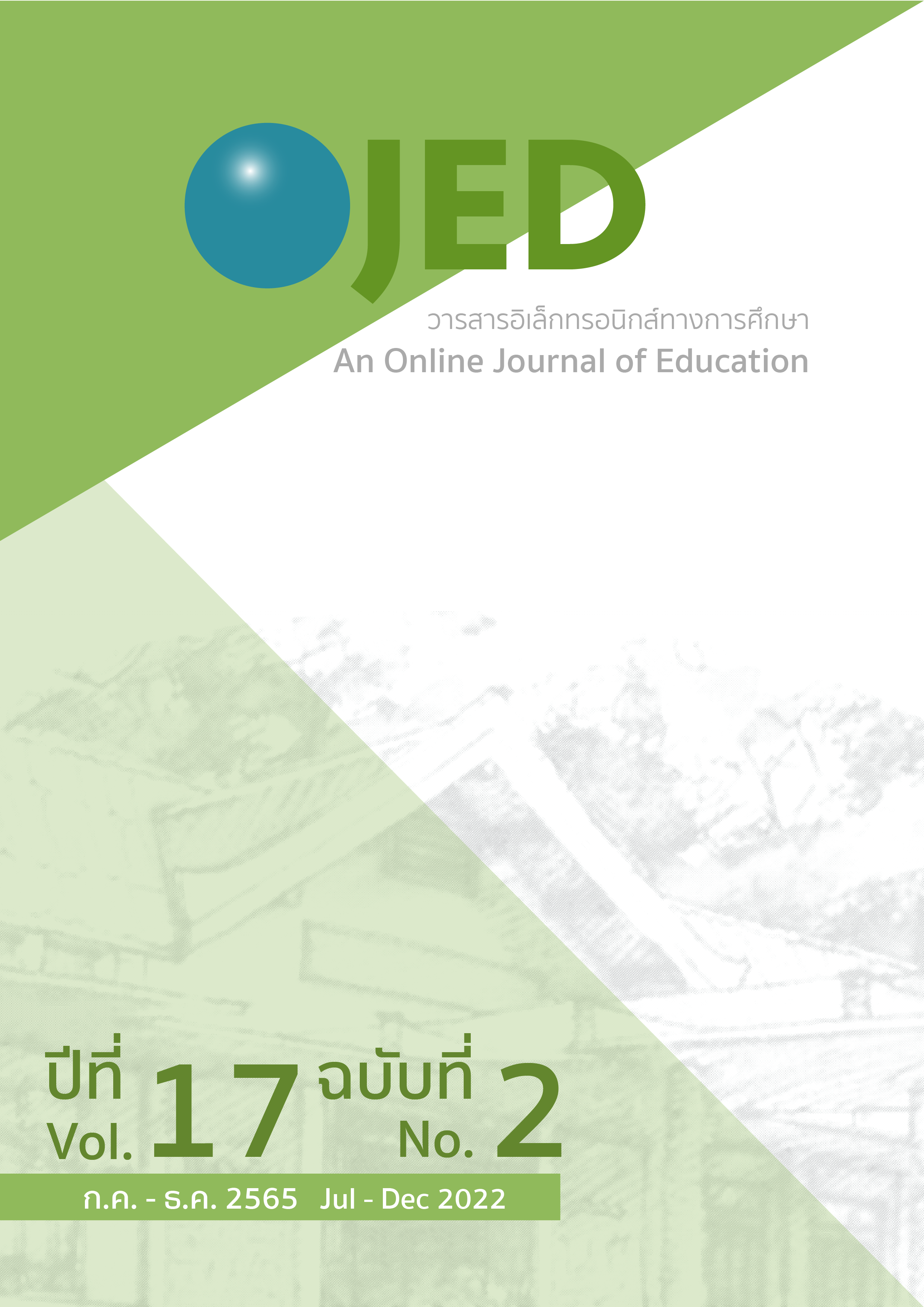A Study of Aggressive Behaviors of Young Children and the Solutions
DOI:
https://doi.org/10.14456/ojed.2022.44Keywords:
aggressive behavior, early childhoodAbstract
This study aimed to study the aggressive behaviors of young children and determine solutions for these behaviors. The target group included three parents, three kindergarten teachers, two psychologists and two pediatricians. The instruments used were interview forms for parents, teachers, psychologists and pediatricians. Data were collected and analyzed using descriptive analysis. The study showed that children displayed physical and verbally aggressive behaviors as a result of imitating technological medias and daily life applications. Furthermore they also unconsciously imitated aggressive behaviors by their parents. The study also found that teachers taught and assisted young children with aggressive behaviors, while parental and caregiver education was found to be a strategy to prevent these problems. Also, teachers should understand and must not teach children with aggressive behaviors. The cause of aggressive behaviors should be included to identify and assist young children in order to solve direct aggressive behaviorals problems.
References
ขวัญใจ จริยาทัศน์กร. (2558). โมเดลเชิงสาเหตุของพฤติกรรมการใช้ความรุนแรงของนักเรียน นักศึกษาระดับอาชีวศึกษา การตรวจสอบความเที่ยงตรงของอิทธิพลจากการศึกษาระยะยาว และการศึกษาภาคตัดขวาง [วิทยานิพนธ์ปริญญาดุษฎีบัณฑิต ไม่ได้ตีพิมพ์]. มหาวิทยาลัยบูรพา.
ซาอีดะห์ เกษา. (2558). วัยรุ่นกับความรุนแรงเชิงวัฒนธรรมในอำเภอเมือง จังหวัดสตูล [วิทยานิพนธ์ปริญญามหาบัณฑิต ไม่ได้ตีพิมพ์]. มหาวิทยาลัยสงขลานครินทร์.
ณัฐพล สุวรรณช่าง. (2557). ความสัมพันธ์ระหว่างการอบรมเลี้ยงดู ความฉลาดทางอารมณ์และการป้องกันความเสี่ยงต่อการฆ่าตัวตายของนิสิต นักศึกษามหาวิทยาลัยของรัฐ ในเขตกรุงเทพมหานคร [วิทยานิพนธ์ปริญญามหาบัณฑิต ไม่ได้ตีพิมพ์]. มหาวิทยาลัยเกษตรศาสตร์
ดวงใจ สมานสิน. (2539). การเปรียบเทียบพฤติกรรมก้าวร้าวของนักเรียนประถมศึกษา ระหว่างผู้ที่เล่นวิดีโอเกมและไม่เล่นวิดีโอเกม [วิทยานิพนธ์ปริญญามหาบัณฑิต ไม่ได้ตีพิมพ์]. มหาวิทยาลัยเกษตรศาสตร์.
ทวีศิลป์ วิษณุโยธิน. (2561). ความรุนแรงในครอบครัว. วารสารสุชภาพจิต, 26(2), 2.
นิศารัตน์ บึงลี. (2554). ความคิดเห็นของผู้ปกครองเกี่ยวกับอิทธิพลของรายการโทรทัศน์ที่มีต่อพฤติกรรมด้านการพูดและการเล่นของเด็กปฐมวัย [วิทยานิพนธ์ปริญญามหาบัณฑิต ไม่ได้ตีพิมพ์]. มหาวิทยาลัยเกษตรศาสตร์.
นุชพรรณ คงถาวร. (2552). ปัจจัยที่มีความสัมพันธ์กับพฤติกรรมก้าวร้าวของเด็กปฐมวัย [วิทยานิพนธ์ปริญญามหาบัณฑิต ไม่ได้ตีพิมพ์]. มหาวิทยาลัยเกษตรศาสตร์.
ปัทมาวดี เล่ห์มงคล. (2563). ประวัติความเป็นมาและแนวคิดทางการปฐมวัยศึกษา [เอกสารไม่ได้ตีพิมพ์]. ภาควิชาการศึกษา คณะศึกษาศาสตร์, มหาวิทยาลัยเกษตรศาสตร์.
ปิยะนันท์ หิรัณย์ชโลทร. (2560) การศึกษาสำหรับผู้ปกครอง [เอกสารไม่ได้ตีพิมพ์]. ภาควิชาการศึกษา คณะศึกษาศาสตร์, มหาวิทยาลัยเกษตรศาสตร์.
พระราชบัญญัติการพัฒนาเด็กปฐมวัย พ.ศ. 2562. (2562, 30 เมษายน). ราชกิจจานุเบกษา. เล่ม 136 ตอนที่ 56ก. หน้า 5-16
พัชชา รุ่งเรือง. (2560). การลดพฤติกรรมก้าวร้าวของเด็กอนุบาลชั้นปีที่ 1/3 ศูนย์พัฒนาเด็กเล็กโรงเรียนวัดไผ่โรงวัว โดยใช้กิจกรรมการเล่านิทานลดพฤติกรรมก้าวร้าว. คณะครุศาสตร์ มหาวิทยาลัยสวนดุสิต.
รักขณาวรรณ เสาทอง. (2556). ปัจจัยที่ส่งผลต่อพฤติกรรมก้าวร้าวของนักเรียนชั้นประถมศึกษาปีที่ 6 สังกัดเขตพื้นที่การประถมศึกษาราชบุรี เขต 2 อำเภอโพธาราม จังหวัดราชบุรี [วิทยานิพนธ์ปริญญามหาบัณฑิต ไม่ได้ตีพิมพ์]. มหาวิทยาลัยศิลปากร.
วรรณจรี มณีแสง. (2560). ปัญหาพฤติกรรมของนักเรียนระดับอนุบาลและประถมศึกษาในโรงเรียนเขตชุมชน. คณะพยาบาลศาสตร์ มหาวิทยาลัยเวสเทิร์น.
วรรณภรณ์ พุฒิพิรุฬห์วงศ์. (2562). สื่อเกมออนไลน์ที่มีผลต่อพฤติกรรมความรุนแรงของเยาวชนในพื้นที่อำเภอเมือง จังหวัดชลบุรี [วิทยานิพนธ์ปริญญามหาบัณฑิต ไม่ได้ตีพิมพ์]. มหาวิทยาลัยบูรพา.
ส่องแสง ถิ่นวัลย์. (2552). พฤติกรรมความรุนแรงของเด็ก : ศึกษาปัจจัยสิ่งแวดล้อมที่ส่งผลต่อพฤติกรรมความรุนแรงของเด็กอายุ 2-6 ปี ณ สถานรับเลี้ยงเด็กบ้านเทพชุมชนสวนอ้อย เขตคลองเตย [วิทยานิพนธ์ปริญญามหาบัณฑิต ไม่ได้ตีพิมพ์]. มหาวิทยาลัยธรรมศาสตร์.
สุมณฑา หิ้มทอง. (2559). การสำรวจพฤติกรรมก้าวร้าวและการจัดการพฤติกรรมก้าวร้าวในเด็กปฐมวัยโดยผู้ดูแลของศูนย์พัฒนาเด็กเล็ก สังกัดองค์กรปกครองส่วนท้องถิ่น [วิทยานิพนธ์ปริญญามหาบัณฑิต ไม่ได้ตีพิมพ์]. มหาวิทยาลัยสงขลานครินทร์.
อรรถพล พรมบรรดิษฐ. (2559). การ์ตูนแอนิเมชันมีผลต่อพฤติกรรมความรุนแรงของนักเรียนชั้นประถมศึกษาในกรุงเทพมหานคร [วิทยานิพนธ์ศิลปศาสตรมหาบัณฑิต ไม่ได้ตีพิมพ์]. มหาวิทยาลัยรามคำแหง.
Bandura, A. (1986). Social foundations of thought and action: A social cognitive theory. Prentice-Hall.
Breuer, J., Vogelgesang, Quandt, Festl. (2015). Violent video games and physical aggression: Evidence for a selection effect among adolescents. Psychology of Popular Media Culture, 4(4), 305-328.
Bronfenbrenner, U. (1994). Ecological model of human development. In International Encyclopedia of Education. Elsevier.
Cunningham, S., Engelstatter, B., & Ward, M. R. (2016). Violent video games and violent crime. Southern Economic Journal, 82(4), 1247-1265.
Ferguson, C. J. (2015). Do Angry Birds make for angry children? A meta-analysis of video game influences on children's and adolescents' aggression, mental health, prosocial behavior, and academic performance. Perspectives on Psychological Science, 10(5), 646-666.
Hay, D. F., Johansen, M. K., Daly, P., Hashmi, S., Robinson, C., Collishaw, S., & Goozen, S. V. (2018). Seven-year-olds' aggressive choices in a computer game can be predicted in infancy. Developmental Science, 21(3), 7, Article e12576.
Huesmann, LR. (1986). Psychological processes promoting the relation between exposure to media violence and aggressive behavior by the viewer. J Soc, Issue 42, 125-140.
Przybylski, A. K., & Weinstein. (2019). Violent video game engagement is not associated with adolescents' aggressive behaviour: Evidence from a registered report. Royal Society Open Science, 6(2), 171474.
Downloads
Published
How to Cite
Issue
Section
License
Copyright (c) 2022 An Online Journal of Education

This work is licensed under a Creative Commons Attribution-NonCommercial-NoDerivatives 4.0 International License.




